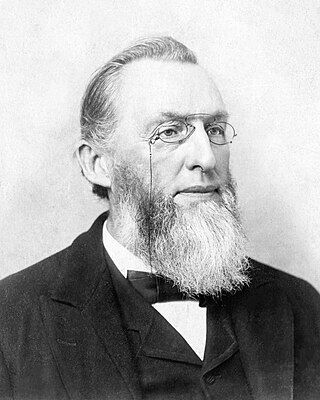Liberty magazine may refer to:
A record, recording or records may refer to:
Liberty is the ability to do as one pleases, or have the power and resources to fulfill one's purposes.
Ministry may refer to:

James Springer White, also known as Elder White, was a co-founder of the Seventh-day Adventist Church and husband of Ellen G. White. In 1849 he started the first Sabbatarian Adventist periodical entitled The Present Truth, in 1855 he relocated the fledgling center of the movement to Battle Creek, Michigan, and in 1863 played a pivotal role in the formal organization of the denomination. He later played a major role in the development of the Adventist educational structure beginning in 1874 with the formation of Battle Creek College.
Sign of the Times, A Sign of the Times, or Signs of the Times may refer to:
Signs may refer to:

The Seventh-day Adventist Church had its roots in the Millerite movement of the 1830s to the 1840s, during the period of the Second Great Awakening, and was officially founded in 1863. Prominent figures in the early church included Hiram Edson, Ellen G. White, her husband James Springer White, Joseph Bates, and J. N. Andrews. Over the ensuing decades the church expanded from its original base in New England to become an international organization. Significant developments such the reviews initiated by evangelicals Donald Barnhouse and Walter Martin, in the 20th century led to its recognition as a Christian denomination.

Uriah Smith was a Seventh-day Adventist author, minister, educator, and theologian who is best known as the longest serving editor of the Review and Herald for over 50 years.

The Creation Seventh Day (and) Adventist Church began as a small group that broke off from the Seventh-day Adventist Church in 1988, and organized its own church in 1991. It has been involved in court cases with the General Conference of Seventh-day Adventists over trademarks and internet domain names.
Land and liberty or land and freedom may refer to:
Remnant or remnants may refer to:
Progressive Adventists are members of the Seventh-day Adventist Church who prefer different emphases or disagree with certain beliefs traditionally held by mainstream Adventism and officially by the church. While they are often described as liberal Adventism by other Adventists, the term "progressive" is generally preferred as a self-description. This article describes terms such as evangelical Adventism, cultural Adventism, charismatic Adventism, and progressive Adventism and others, which are generally related but have distinctions.
Historic Adventism is an informal designation for conservative individuals and organizations affiliated with the Seventh-day Adventist Church who seek to preserve certain traditional beliefs and practices of the church. They feel that the church leadership has shifted or departed from key doctrinal "pillars" ever since the middle of the 20th century. Specifically, they point to the publication in 1957 of a book entitled Seventh-day Adventists Answer Questions on Doctrine; which they feel undermines historic Adventist theology in favor of theology more compatible with evangelicalism. Historic Adventism has been erroneously applied by some to any Adventists that adhere to the teachings of the church as reflected in the church's fundamental beliefs such as the Sabbath or the Spirit of Prophecy. They misapply those who hold to mainstream traditional Adventist beliefs as synonymous with Historic Adventist.
Signs of the Times is a monthly subscription magazine published by Signs Publishing Company, a Seventh-day Adventist publishing house, for Australia and New Zealand. "Signs" is an easy-to-read magazine for the general public focused on understanding current issues from a biblical point of view as well as promoting a holistic and healthy Adventist lifestyle.

William Clarence "Willie" White was a son of Ellen G. White and James Springer White, two of the founders of the Seventh-day Adventist Church. He became a well-known Seventh-day Adventist minister and church leader. W.C.'s son Arthur L. White worked closely with him and succeeded his father as Secretary of the White Estate.
This article describes the relationship between the Seventh-day Adventist Church and other Christian denominations and movements, and other religions. Adventists resist the movement which advocates their full ecumenical integration into other churches, because they believe that such a transition would force them to renounce their foundational beliefs and endanger the distinctiveness of their religious message. According to one church document,
Albion Ballenger was a 19th-century Seventh-day Adventist minister and author.

George Arthur Williams was a 20th-century politician who served as the 18th lieutenant governor of Nebraska from 1925 to 1931.